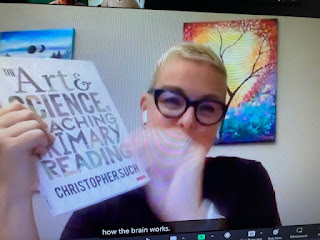Warning: today's post includes links to text with coarse language.
As an English major in university, I took a lot of poetry classes as part of my undergraduate studies. In my current role as a teacher-librarian, and as an instructional leader for teacher-librarians-in-training, I spend a lot of time thinking and talking about literature. Although it's hard for me to choose my favourite novel, I have a favourite poem. I've debated about sharing it here or not because of the word choice and what people might erroneously infer. If you see this post as public, that means that I've chosen to publish it. This is my favourite poem.
This Be The Verse
by Phillip Larkin
I think people would be surprised at my choice. It's very grim and I'm a usually positive person. I like it for several reasons. Wikipedia shares its interpretations. You can find other analysis articles by Dr. Oliver Tearle or LitCharts or PoemAnalysis. For me, I like the shocking contradiction between the title and the first line. I appreciate the deliberate use of a "taboo" word. I've talked with young students before about how or why authors might use "inappropriate" language in a bit; there are legitimate reasons for curse words to appear, even when we don't want students to use them regularly themselves. It relates tot he power of language (especially when it's unexpected - hearing your grandma drop the "f'-bomb" when she usually limits herself to nothing stronger than a "golly" means that something was very impactful). The last two lines aren't something I'd aspire to or cling to as a viable solution (although some literary critics suggest that it's an impossible or tongue-in-cheek resolution).
I worried that the theme was a bit controversial for me to share. "Does this mean you hate your parents?" No, not at all. Quite the contrary, which is what gets me into a bit of a pickle. I'm a pretty public person and open book, which includes sometimes discussing family matters on my blog. Not everyone is comfortable with that attitude. My blog is a way I keep in touch with people as well as share my thoughts; it's convenient to share in such a straight-forward way. It is because of respect for other people (and a reluctance to cause drama) that prevents me from sharing even more. This conundrum actually links to the poem. Past generations have been very concerned about "airing dirty laundry". There were just certain topics that were to be avoided as frequently as possible. This can be a problem. Even though it is painful and fraught with difficulties, it's better to communicate more openly. However, it's challenging to change patterns of behaviour, as the poem suggests.
One pattern of behaviour that grew due to COVID that I hope to change is my "reading drought". I found it very hard to read up until recently. Jennifer Brown shared several great books that she's devouring that I want to read as well (such as The Art and Science of Primary Reading pictured below). Next week on this blog, I hope to go into detail about the end of my July AQ course and praise my co-instructors and guest speakers like Jenn ... OR tell you all about the new pets I just acquired. Stay tuned.


The Larkin is brilliant. Concise and beautiful and angry and true as great writing often is. And I adore the opening line, I really do. I need you to know how very thankful I am for what you share. It is therapeutic. I also firmly believe that you can love your parents (and children) deeply while still wholeheartedly agreeing with the sentiment.
ReplyDelete